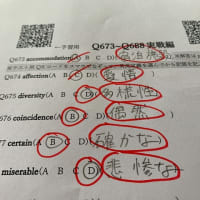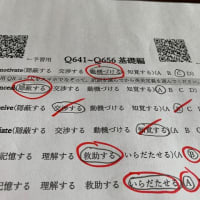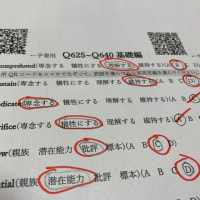英語学習において、「読み書きは得意なのに、英会話は苦手な日本人」という迷信ほどたちの悪いものはありません。三面記事が満足に読めない段階で社説を読ませるような旧来の英語教育では、会話であれ読み書きであれ得意になるのはきわめて困難です。まずは、高い精度と速度で読めるやさしい英語にたくさん触れて、和訳せずに理解する英語思考力の養成をおすすめします。それができれば英会話習得も難しくありません。
著作権の切れた童話「ドリトル先生アフリカゆき」から、シンプルで、大学入試にもTOEICにも英検にも有効な練習問題を作成しています。楽しみながら英語力を伸ばしていただければ幸いです。
ちなみにここのブログの運営者がはじめて「ドリトル先生シリーズ」に触れたのはTOEIC800台にようやく到達した頃でした。楽しくもかなり勉強になり、「どうしてもっと早く読まなかったのだろう」と歯ぎしりした記憶があります。英検1級/TOEIC900点レベルに到達する日本人英語学習者を増やすには、旧来の大学入試英語のあり方を大幅に修正する必要があるようです。
(24)
THE FOURTEENTH CHAPTER
THE RATS' WARNING
DRAGGING a ship through the sea is hard work. And after two or three hours the swallows ①(get / began / tired / to) in the wings and short of breath. Then they sent a message down to the Doctor to say that they would have to take a ②*(rest : tale : trend : custom) soon; and that they would pull the boat over to an island not far off, and hide it in a deep bay till they had got breath ③(on / enough / go / to).
And presently the Doctor saw the island they had spoken of. It had a very beautiful, high, green mountain in the middle of it.
When the ship had ④(reacted : pleased : sailed : resolved ) safely into the bay where it could not be seen from the open sea, the Doctor said he would get off on to the island to look for water—because there was none left to drink on his ship. And he told all the animals to get out too and romp on the grass to ⑤(scream : survey : distinguish : stretch) their legs.
Now as they were getting off, the Doctor ⑥*(obtained : noticed : predicted : intended) that a whole lot of rats were coming up from downstairs and leaving the ship as well. Jip started to run after them, because chasing rats had always been his ⑦*(elementary : favorite : average : precise) game. But the Doctor told him to stop.
And one big black rat, who seemed to want to say something to the Doctor, now ⑧(piled : exceeded : glowed : crept) forward timidly along the rail, watching the dog out of the corner of his eye. And after he had ⑨(roamed : coughed : leaked : crashed) nervously two or three times, and cleaned his whiskers and wiped his mouth, he said,
"Ahem—er—you know of course that all ships have rats in them, Doctor, do you not?"
And the Doctor said, "Yes."
"And you have heard that rats always leave a sinking ship?"
"Yes," said the Doctor—"so I've been told."
"People," said the rat, "always speak of it with a sneer—as though it were something disgraceful. But you can't ⑩*(bury : doubt : blame : avoid) us, can you? After all, who WOULD stay on a sinking ship, if he could get off it?"
"It's very natural," said the Doctor—"very natural. I quite understand.... Was there— Was there anything else you wished to say?"
"Yes," said the rat. "I've come to tell you that we are leaving this one. But we wanted to ⑪*(warn : preserve : occupy : surround) you before we go. This is a bad ship you have here. It isn't safe. The sides aren't strong enough. Its boards are ⑫**(terrific : rotten : vivid : wicked). Before to-morrow night it will sink to the bottom of the sea."
"But how do you know?" asked the Doctor.
"We always know," answered the rat. "The tips of our tails get that tingly feeling—like when your foot's asleep. This morning, at six o'clock, while I was getting breakfast, my tail suddenly began to tingle. At first I thought it was my rheumatism coming back. So I went and asked my ⑬(how / aunt / felt / she)—you remember her?—the long, piebald rat, rather skinny, who came to see you in Puddleby last Spring with jaundice? Well—and she said HER tail was tingling like everything! Then we knew, for sure, that this boat was going to ⑭(less / sink / than / in) two days; and we all ⑮(minds / made / our / up) to leave it as soon as we got near enough to any land. It's a bad ship, Doctor. Don't sail in it any more, or you'll be surely ⑯(erased : drowned : expired : contaminated).... Good-by! We are now going to look for a good place to live on this island."
"Good-by!" said the Doctor. "And thank you very much for coming to tell me. Very ⑰**(potential : moderate : horrible : considerate) of you—very! Give my ⑱*(means : regards : matters : regrets) to your aunt. I remember her perfectly.... Leave that rat alone, Jip! Come here! Lie down!"
So then the Doctor and all his animals went off, carrying pails and saucepans, to look for water on the island, ⑲*(although : while : unless : if) the swallows took their rest.
"I wonder what is the name of this island," said the Doctor, as he was climbing up the mountainside. "It seems a ⑳*(nuclear : pleasant : mere : abundant) place. What a lot of birds there are!"
※(24)の解答①(began to get tired)②(rest)③(enough to go on)④(sailed)⑤(stretch)⑥(noticed)⑦(favorite)⑧(crept)⑨(coughed) ⑩(blame)⑪(warn)⑫(rotten)⑬(aunt how she felt)⑭(sink in less than) ⑮(made up our minds)⑯(drowned)⑰(considerate)⑱(regards)⑲( while)⑳(pleasant)
著作権の切れた童話「ドリトル先生アフリカゆき」から、シンプルで、大学入試にもTOEICにも英検にも有効な練習問題を作成しています。楽しみながら英語力を伸ばしていただければ幸いです。
ちなみにここのブログの運営者がはじめて「ドリトル先生シリーズ」に触れたのはTOEIC800台にようやく到達した頃でした。楽しくもかなり勉強になり、「どうしてもっと早く読まなかったのだろう」と歯ぎしりした記憶があります。英検1級/TOEIC900点レベルに到達する日本人英語学習者を増やすには、旧来の大学入試英語のあり方を大幅に修正する必要があるようです。
(24)
THE FOURTEENTH CHAPTER
THE RATS' WARNING
DRAGGING a ship through the sea is hard work. And after two or three hours the swallows ①(get / began / tired / to) in the wings and short of breath. Then they sent a message down to the Doctor to say that they would have to take a ②*(rest : tale : trend : custom) soon; and that they would pull the boat over to an island not far off, and hide it in a deep bay till they had got breath ③(on / enough / go / to).
And presently the Doctor saw the island they had spoken of. It had a very beautiful, high, green mountain in the middle of it.
When the ship had ④(reacted : pleased : sailed : resolved ) safely into the bay where it could not be seen from the open sea, the Doctor said he would get off on to the island to look for water—because there was none left to drink on his ship. And he told all the animals to get out too and romp on the grass to ⑤(scream : survey : distinguish : stretch) their legs.
Now as they were getting off, the Doctor ⑥*(obtained : noticed : predicted : intended) that a whole lot of rats were coming up from downstairs and leaving the ship as well. Jip started to run after them, because chasing rats had always been his ⑦*(elementary : favorite : average : precise) game. But the Doctor told him to stop.
And one big black rat, who seemed to want to say something to the Doctor, now ⑧(piled : exceeded : glowed : crept) forward timidly along the rail, watching the dog out of the corner of his eye. And after he had ⑨(roamed : coughed : leaked : crashed) nervously two or three times, and cleaned his whiskers and wiped his mouth, he said,
"Ahem—er—you know of course that all ships have rats in them, Doctor, do you not?"
And the Doctor said, "Yes."
"And you have heard that rats always leave a sinking ship?"
"Yes," said the Doctor—"so I've been told."
"People," said the rat, "always speak of it with a sneer—as though it were something disgraceful. But you can't ⑩*(bury : doubt : blame : avoid) us, can you? After all, who WOULD stay on a sinking ship, if he could get off it?"
"It's very natural," said the Doctor—"very natural. I quite understand.... Was there— Was there anything else you wished to say?"
"Yes," said the rat. "I've come to tell you that we are leaving this one. But we wanted to ⑪*(warn : preserve : occupy : surround) you before we go. This is a bad ship you have here. It isn't safe. The sides aren't strong enough. Its boards are ⑫**(terrific : rotten : vivid : wicked). Before to-morrow night it will sink to the bottom of the sea."
"But how do you know?" asked the Doctor.
"We always know," answered the rat. "The tips of our tails get that tingly feeling—like when your foot's asleep. This morning, at six o'clock, while I was getting breakfast, my tail suddenly began to tingle. At first I thought it was my rheumatism coming back. So I went and asked my ⑬(how / aunt / felt / she)—you remember her?—the long, piebald rat, rather skinny, who came to see you in Puddleby last Spring with jaundice? Well—and she said HER tail was tingling like everything! Then we knew, for sure, that this boat was going to ⑭(less / sink / than / in) two days; and we all ⑮(minds / made / our / up) to leave it as soon as we got near enough to any land. It's a bad ship, Doctor. Don't sail in it any more, or you'll be surely ⑯(erased : drowned : expired : contaminated).... Good-by! We are now going to look for a good place to live on this island."
"Good-by!" said the Doctor. "And thank you very much for coming to tell me. Very ⑰**(potential : moderate : horrible : considerate) of you—very! Give my ⑱*(means : regards : matters : regrets) to your aunt. I remember her perfectly.... Leave that rat alone, Jip! Come here! Lie down!"
So then the Doctor and all his animals went off, carrying pails and saucepans, to look for water on the island, ⑲*(although : while : unless : if) the swallows took their rest.
"I wonder what is the name of this island," said the Doctor, as he was climbing up the mountainside. "It seems a ⑳*(nuclear : pleasant : mere : abundant) place. What a lot of birds there are!"
※(24)の解答①(began to get tired)②(rest)③(enough to go on)④(sailed)⑤(stretch)⑥(noticed)⑦(favorite)⑧(crept)⑨(coughed) ⑩(blame)⑪(warn)⑫(rotten)⑬(aunt how she felt)⑭(sink in less than) ⑮(made up our minds)⑯(drowned)⑰(considerate)⑱(regards)⑲( while)⑳(pleasant)






















※コメント投稿者のブログIDはブログ作成者のみに通知されます